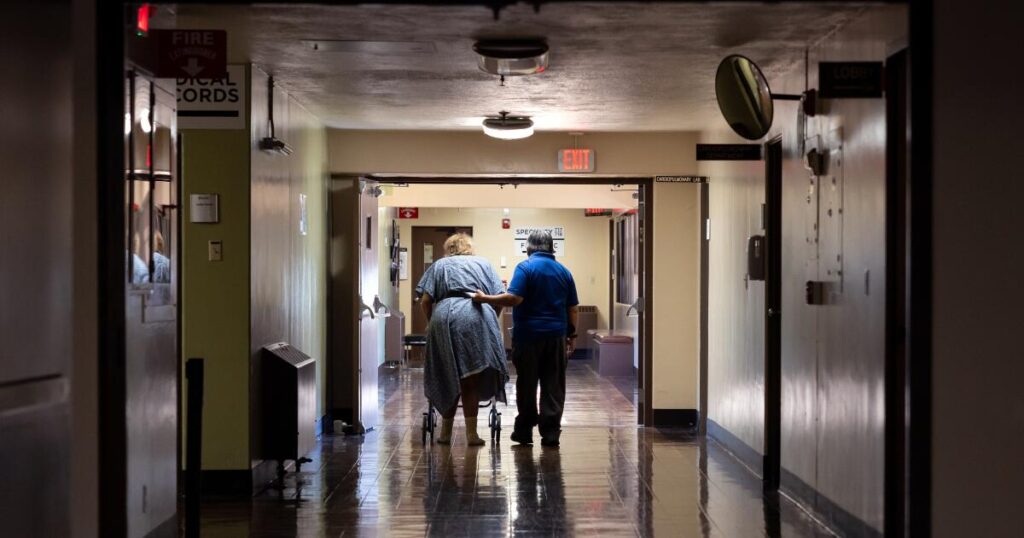
The closure of Glenn Medical Center in Willows, California, on October 21, 2023, has raised urgent concerns about the future of healthcare in the region. The hospital, which served the community for over 70 years, shut its doors as local residents faced a significant loss of access to emergency medical care.
As staff members removed equipment from empty patient rooms, Theresa McNabb, a 74-year-old patient, prepared to leave after six weeks of treatment for a severe infection. “I feel a little anxiety,” she admitted, fearing how she would manage daily tasks like cooking and shopping once back in her apartment. McNabb was the last patient to leave, marking an emotional end to the institution’s long-standing role in the community.
For residents of Willows, including many low-income families, the implications of the hospital’s closure are dire. With emergency medical care now over 30 miles away, local officials are worried about the potential for worsening health outcomes, including preventable deaths. “People are going to die,” warned Monica Rossman, a supervisor in Glenn County. She expressed concern that older residents without transportation would delay seeking necessary medical attention.
The closure signals broader challenges facing rural hospitals across California and the United States. According to a 2022 study, half of the hospitals in California were operating at a loss before recent federal cuts to Medicaid funding and the Affordable Care Act. The economic stability of small hospitals is increasingly jeopardized, with Palo Verde Hospital in Blythe filing for bankruptcy and Southern Inyo Hospital in Lone Pine seeking emergency funds this fall.
The reasons behind Glenn Medical’s closure are complex. Although not directly caused by federal funding cuts, the hospital lost its “Critical Access” designation due to a federal review. This designation previously allowed the hospital to receive higher reimbursement rates. Federal officials determined that Glenn Medical was only 32 miles from the nearest hospital, just shy of the 35-mile requirement mandated by law. Despite efforts by local officials to advocate for an exception, the hospital’s fate was sealed.
Community leaders, including Rick Thomas, Willows’ Vice Mayor, expressed their fears over the economic impact of the closure. “We’ve lost 150 jobs already from the hospital closing,” he said, highlighting the potential long-term effects on local business and development.
Glenn Medical Center, originally known as Glenn General Hospital, opened its doors on November 21, 1950. Over the years, it became a cornerstone of healthcare in the area, providing services not only to residents but also to victims of accidents on the nearby interstate. Despite its historical significance, the hospital struggled with financial instability, a common issue for rural healthcare facilities that serve older, sicker populations with lower reimbursement rates.
The hospital had previously faced bankruptcy in 2000 but was saved by receiving the Critical Access designation, which allowed for better financial support. The situation improved under the management of American Advanced Management, a private company that specializes in rescuing distressed rural hospitals. Yet, the recent federal decisions have shattered hopes for continued viability.
As the final day approached, hospital staff, including nurse Amanda Shelton, provided care while contemplating their uncertain futures. Shelton gifted McNabb a sweater as a farewell gesture, emphasizing the close-knit community atmosphere that characterized the hospital. “It’s not every day that it will be the last patient I’ll ever have,” she said, reflecting on the emotional weight of the moment.
The closure of Glenn Medical Center is not an isolated incident. Similar situations are unfolding across California. Other hospitals, including Bear Valley Community Hospital and Santa Ynez Valley Cottage Hospital, are evaluating their own Critical Access statuses. Peggy Wheeler, vice president of policy at the California Hospital Association, warned, “It’s like the beginning of a tidal wave,” indicating that without intervention, many more rural hospitals could face imminent closure.
In Willows, the emotional toll of the hospital’s closure is palpable. Longtime residents like Rose Mary Wampler, who has lived in the area since 1954, expressed fear over the distance they must now travel for healthcare. “It looks like somebody just shut off the whole city, there’s nowhere to go get help,” she said, staring at the now-deserted hospital.
The loss of Glenn Medical Center underscores a growing crisis in rural healthcare, with critical implications for both community health and local economies. As policymakers confront these challenges, the need for effective solutions becomes increasingly urgent.







